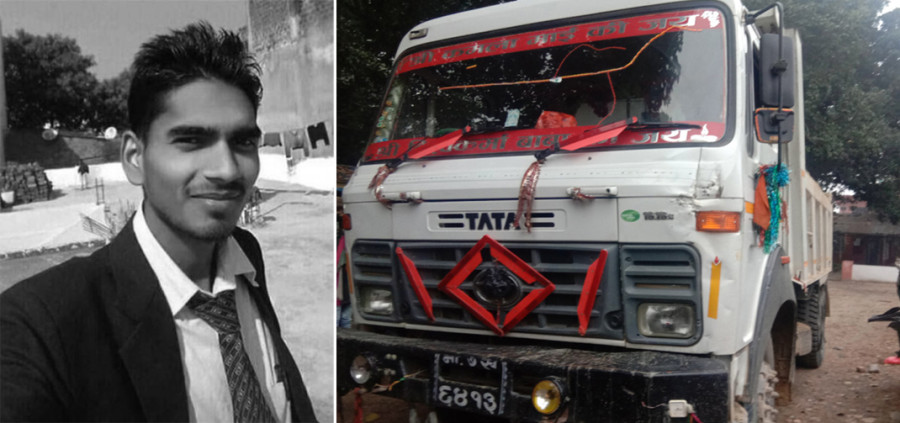Columns
Dilip Mahato should have been a hero. Instead, he will be forgotten.
Dilip’s murder encapsulates several of the ills that ail this tottering republic.
Amish Raj Mulmi
By all accounts, Om Prakash Mahato (Dilip) was the sort of person Nepal needed. He was studying Mechanical Engineering, and was in his final year at Bhopal, India. He did not want to go abroad; he wanted to return home to his village Sripur, in Mithila Municipality of Dhanusa. He resolved disputes, according to his neighbour. And he had been protesting the illegal extraction of sand and pebbles from the Aurahi river for the last two years.
At a time when Nepal has surely been lacking role models one can look up to, the 24-year-old Dilip could have been a hero our republic needs. For surely, the murder of Dilip by Bipin Mahato, the owner of the Churiyamai Sand Processing Factory, and his cronies on 10 December 2019 is another reminder of the dark abyss this infant republic is headed towards. Dilip’s murder encapsulates several of the ills that plagues Nepal. There is of course the impunity that comes with the very cold-bloodedness of the murder: Dilip was stabbed first, then laid to rest on the river bed, before being finally crushed to death by a tipper-truck. Imagine the brazenness: just a day earlier, Bipin had threatened to run the tipper over Dilip. Only those with the belief that nothing can happen to them deliver on their threats.
Then there’s the politician-bureaucrat-private sector nexus. The District Coordination Committee has blamed the police for not taking action—fuel was budgeted for monitoring illegal extraction practices, but the police allegedly did not take any. The business falls under local government units, and it is alleged several representatives’ elections were funded by such illegal industries. The mayor himself is alleged to have interests in the business. If this were a one-off incident, it could have been deemed a simple killing. But Dilip’s murder is just another symptom of the nexus that ails Nepal. Similar cases of collusion between the sand ‘mafia’ and government units have been documented in several other places, with those raising a voice against it attacked on the outskirts of the valley and in Udayapur. Then there was the excavator attack on Baitadi locals protesting haphazard road construction.
This nexus is not limited to local governments. If anything, the local units have learnt from the top. Two glittering examples will suffice: the first, the extraordinary Teku bridge, built over five long years by the outstanding public works contractor Pappu Construction, and deemed unsafe for vehicular traffic (those who wish to see another shining light of civil engineering in Nepal must immediately google the Babai river bridge in Bardiya built by the same contractor). The second, the charges of collusion against the Yeti group that had been appearing in print media on a daily basis. In any functioning country of the world, such a slew of charges would have invited a thorough investigation, massive public outcry, and perhaps a rethink by multilateral institutions like the United Nations which have a formal association with the group’s airline. But Nepal being what it is, business has gone on as usual.
Dilip’s murder is equally a story about the haphazard urbanisation practices Nepal is seeing. Political stability—which is often not a marker for stable governance—and rising disposable incomes post the remittance boom has provided Nepalis with the means to build new homes, or migrate to better pastures. A government more concerned with long-term goals than short-term gains would incorporate and implement urban planning at the earliest, not just because Nepal is seeing one of the fastest urbanisation rates in Asia, but because urban planning can, in the long run, generate sufficient revenues through licensing, contract works, and proper demarcation of urban settlements. But like our government, our cities will soon come to be a shining beacon of short-term thinking.
All developing countries possess a hunger for natural resources, however meagre they might be. Such is the case in Nepal too—the goal is to extract as much as possible, in as little time as one can. The same lens is applied on our rivers, which is why the illegal mining industry flourishes. Again, a more sensible government would look at natural resources not just as resources, but also as intangible heritage comparable to the temples that forever populate Visit Nepal advertisements. At a time when climate change is forcing a reorientation on how we look at resource extraction, here we are, going on as if things haven’t changed, and Nepal is not one of the most affected countries by the biggest challenge for humanity.
Dilip Mahato understood all of these, and more. His indomitable courage, in any other society, would have inspired thousands, maybe even millions. But in Nepal, his murder will become a tragic footnote, another ‘martyr’ (how we love that term!), of this tottering republic. ‘The usual hero adventure begins with someone from whom something has been taken, or who feels there is something lacking in the normal experience available or permitted to the members of society. The person then takes off on a series of adventures beyond the ordinary, either to recover what has been lost or to discover some life-giving elixir. It's usually a cycle, a coming and a returning.’
Only in Dilip’s case, there will be no return. There will just be collective amnesia. Haami Yestai Ta Ho Ni Bro, as the rapper V-Ten sang. We are like this only!
***
What do you think?
Dear reader, we’d like to hear from you. We regularly publish letters to the editor on contemporary issues or direct responses to something the Post has recently published. Please send your letters to [email protected] with "Letter to the Editor" in the subject line. Please include your name, location, and a contact address so one of our editors can reach out to you.




 16.12°C Kathmandu
16.12°C Kathmandu















